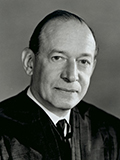

- Tinker v. Des Moines Full Program
- Legacies of Supreme Court Landmark Cases
- Case Preview
- Students' First Amendment Rights
- 40th Anniversary of Supreme Court Decision on Student Speech
- Supreme Court Review
- First Amendment in Schools
- John Tinker on Protesting the Vietnam War in School
- John Tinker on Community Reaction
- The Legacy of Tinker v. Des Moines
Tinker v. Des Moines determined it was a First Amendment violation for public schools to punish students for expressing themselves. In a 7-2 decision, the Court concluded that the rights of children are parallel to the rights of adults and that "students are entitled to freedom of expression of their views."
After wearing black armbands to school in protest of the Vietnam War, three students -- two of them siblings -- were suspended by the Des Moines Independent Community School District for disrupting learning. The parents of the children sued the school for violating the children's rights to free speech. After the district court sided with the school along with the court of appeals, the case reached the Supreme Court.
In the majority opinion, delivered by Justice Fortas, the Court stated students should not be punished for their "passive expression of opinion" and that the ban on armbands came about as a "urgent wish to avoid the controversy … First Amendment rights, applied in light of the special characteristics of the school environment, are available to teachers and students. It can hardly be argued that either students or teachers shed their constitutional rights to freedom of speech or expression at the schoolhouse gate."
 Explainers
Explainers





